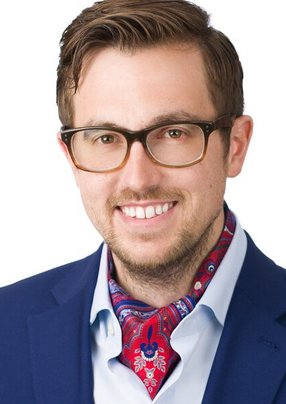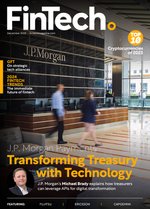
The FinTech Interview: Tyler Seydel, Sunrise Banks
Describe your role and your background. How did you get to this point in your career?
My role today is the Chief Financial Technology Officer. Within the four walls of Sunrise Banks, this role has elements of business development, sales, client relationship management, national product operations – like bringing national products to market and sustaining growth – and core banking operations like teller support. I started my career on the compliance side of the equation and eventually took on director of risk operations, supporting our operational team. Eventually, we grew these operations and my responsibility in fintech.
What or who inspires you in fintech today?
Fintechs are exciting because they’re innovative and iterative. They’re looking at how to do things differently. The most innovative fintechs focus on customer acquisition processes that create an experience. The real differentiator in the future will be the experience behind the scenes. Think about Instagram and Facebook. They started in the same place in terms of posting pictures. But Instagram outpaced Facebook because it took fewer clicks. Instagram is a different experience.
What fintechs do you regularly use yourself?
I’m going to date myself a little. I’m a prolific PayPal user. When PayPal started, they were a fintech – and they still are, maybe, an old-world fintech. On the new-world fintech side, I love Ripple. I’m very forward in the cryptocurrency space. Ripple is trying to solve real-world problems, including money movement and settlement. It creates a lot of opportunities to tokenise that ecosystem, adding clarity and automation.
What’s the best piece of advice you ever received?
First, don’t take things personally. Second, speak from a place of knowing when you’re public speaking. When I was in grad school, a mentor helped me overcome a fear of public speaking by sharing this perspective. And lead with something embarrassing to break the ice and make everyone comfortable.
If you have any words of wisdom for your eight-year-old self, what would it be?
Don’t be afraid of failure. You’ve got to risk it for the biscuit. Don’t focus on the fear of failure but the joy of success.
Can you tell us about Sunrise Banks’ socially responsible lending mission, how that plays out in your growth plans, and how it differentiates you from mainstream lenders?
Socially responsible lending means we pick a side, the side of how to lift people up. For example, small-dollar lending allows us to extend credit to folks without a qualifier like a credit score. Often, a credit score can stand in the way of someone who has a low-to-moderate income and is underbanked. This impacts the options available to them and their quality of life. So, when we talk about socially responsible lending, this is our differentiator and growth driver. We’re looking at quality-of-life improvements and products that support our community.
Working in an environment where you’re impacting people’s day-to-day lives must be a real honour. Is there a personal achievement you’re particularly proud of in the last few years?
I was part of the team that built out our national lending products, including our credit builder product, which is unique because it’s secured with a CD. When you pay off your credit builder loan, you get the money in this CD plus a margin. That is the most synergistic moment I’ve had because we built something that is sustainable and streamlined from an oversight and support perspective – plus, it delivers real-world value that’s consistent with our mission.
Would you like to see more purpose-driven lenders in the market? Is there a need right now?
Yes. Improving our communities starts with finance. If you try to be everything to everyone, you’re going to devolve into being nothing for no one. With our mission, Sunrise Banks is able to focus and create opportunities we might not have had otherwise, like ESG and net zero deposit lending. Being a purpose-driven lender allows us to scale and deliver in ways others can’t deliver on because we specialize.
What value do you see as the ‘big win’ for fintechs and banks when they partner up? Do you have any examples of great partnerships you can share with us?
The big win is when we open up an underserved market by combining the trust, equity and money movement from the bank with the reach of a fintech. That’s where synergy starts to happen, and you’re impacting people’s lives by bringing them into a larger ecosystem.
Has the recent economic volatility affected the collaboration ecosystem? Do you think it’s more imperative than ever to be collaborative, or perhaps you’ve witnessed a cooling of sentiment?
Collaboration is not cooling off; it’s moving to a fever pitch. The macro-environment impacts collaboration – higher interest rates, thinner margins, inflation – and this is being passed to consumers, who are also facing higher costs and economic pressure on things like food and gas. The result is product abandonment. As a result, we’re seeing partners who want to co-create and build a value proposition that’s sustainable, that captures margins for everyone equitably, and that fits our mission.
When it comes to robust compliance, people tend to think of it as a box-ticking exercise. Is there more to compliance than that?
In some respects, it can be viewed as box-checking, but this is a dated and possibly dangerous perspective – risk and risk posture changes. There isn’t a firm box or one-size-fits-all approach. You need to build mechanisms throughout your first and second-line controls. Take it out of compliance and put it in more of a change management, dynamic space that’s fluid and makes it more of a conversation driver.
Do you expect we’ll see more banking regulation post-SVB?
No – but we’ll start to see more active regulators who are more interested in the financial condition of banks.
What makes you get up and go to work each day?
Building products and new things. Looking at the marketplace and doing something different. Creating solutions to problems that create value for people.
Describe yourself in three words.
Competitive, self-reflective, swears a lot!
What was the last good book you read, and when?
Radical Candor by Kim Scott is about creating a mechanism for having tough conversations but not losing your humanity. Secondly, I just started Hesiod. I love old poets.
Featured Interviews
"You have to be agile enough to gravitate to whatever needs your help the most, jump in and solve the problems you need to solve."

